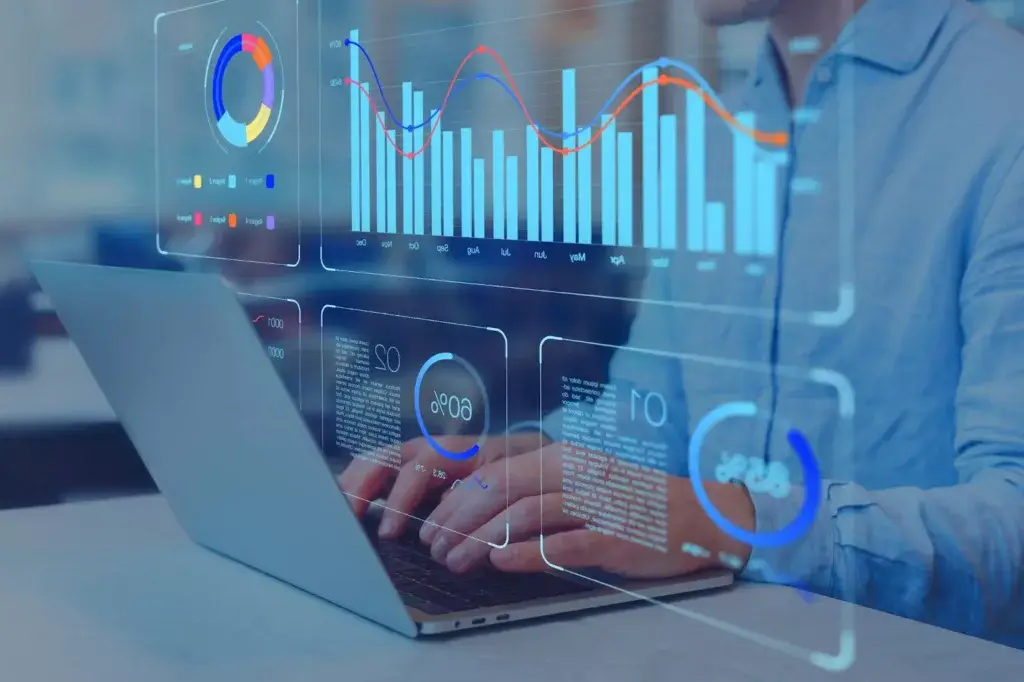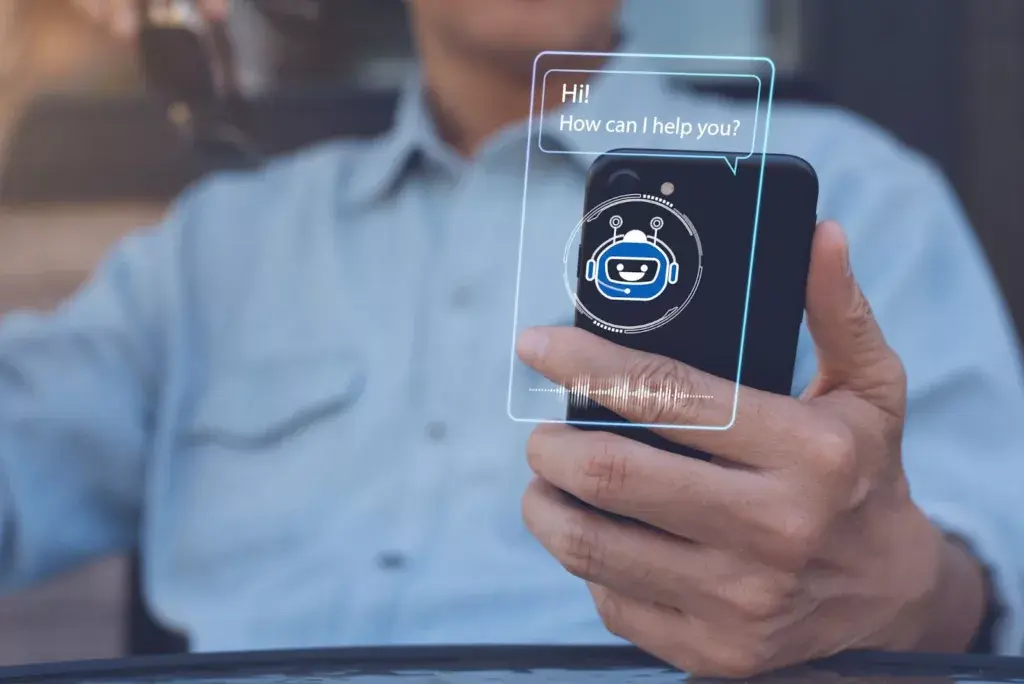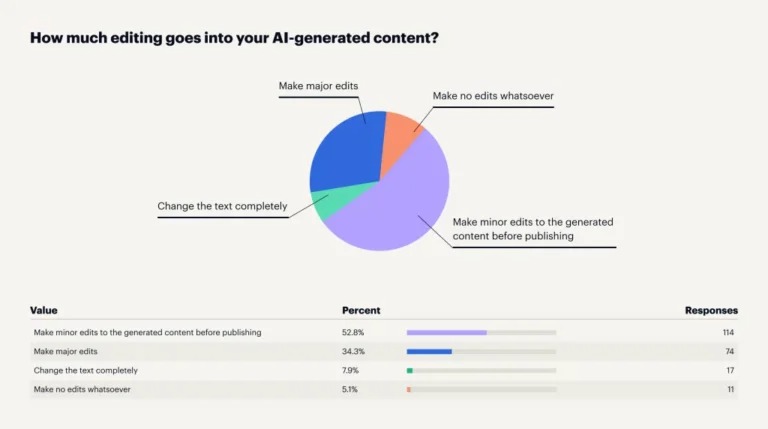How Businesses Are Using AI for Digital Marketing?
Artificial Intelligence (AI) helps businesses with digital marketing by streamlining processes and automating a number of marketing operations. Marketers save time that would have been spent on labor-intensive tasks that are outside the scope of acceptable physical labor or could not be completed in a timely manner.Globally, it is anticipated that artificial intelligence would generate $433 billion in income between 2020 and 2023. Furthermore, it is anticipated that AI marketing will generate much more income in the coming years—projections indicate that it will reach half a trillion dollars by 2023.Therefore, let’s investigate this further to learn how digital marketers employ AI in their operations and to comprehend why more than 74% of people think that humanity will be holding it at workplace by 2030.
What does digital marketing artificial intelligence mean?
Artificial intelligence enables marketing firms, including the top ones in our list, to create a hybrid of mind and intelligence elements.
In addition to achieving the main goal of technological breakthroughs made possible by this technology, using AI for digital marketing streamlines and enhances procedures. Hence, marketing workers may give more time to significant creative tasks as a result from the fast digitization of everyday duties. 75% of marketers reduced their human tasks, & 73% believe they’re more productive, based on HubSpot’s 2024 study on AI Trends:

Artificial intelligence is more than that; it can do jobs and make decisions similar to a human mind, even beyond automation or other basic digital tools. Consequently, this has made it possible for marketing teams to create efficient marketing plans and procedures.Data is required for artificial intelligence (AI) in digital marketing to function in relation to corporate enterprises through models defined by algorithms. Algorithms and models of artificial intelligence are fed by data. Because of this, the need to gather or secure data is a pressing issue that modern business people cannot ignore.
The amount of data produced in the field of digital marketing is astounding. In general, there are four meta-aspects of selling: purchasing, owning, selling, and securing. The key solution towards management and analysis of this ‘big data’ will be found within Artificial Intelligence technologies for companies to improve on their marketing performance.
How Do Companies Use AI for Digital Marketing?
Because artificial intelligence gives companies and brands greater opportunities for interacting with their target audience, it helps digital marketing more effectively.Digital marketers can now conduct audience-specific marketing by using artificial intelligence tools to collect data about their target audience as well as current and potential clients.A huge amount of data processing and evaluation can be done quickly with the use of artificial intelligence. Getting in-depth knowledge of the entire picture will enable marketers to create competitive marketing strategies.
Artificial intelligence is a key promotional investment that offers businesses solutions for improving their advertisements more effectively. In addition, companies can reach the right audience at the right moment and place by using AI digital advertising with suitable content.
Research, analytics, and data that are perfectly matched are the foundation of AI marketing. These days, one of the best methods to achieve amazing results with collecting leads for marketing strategies is to use AI with digital marketing technologies.Let’s examine some important facets of AI’s application in the field of digital marketing:
1.Using AI to Create Marketing Visuals
The role artificial intelligence plays in producing images is becoming more and more obvious. The usage of AI in these marketing images that captivate the target audience is rapidly becoming discovered. Mid journey and Leonardo.ai are some of the technologies leveraging AI to improve designs and foresee impending fashions, all at once. The partnership between Heinz and the firm Rethink is a fantastic illustration of these AI-powered marketing graphics. They introduced a unique advertising campaign called A.I. Ketchup that used entirely computer-generated imagery.
Even in the absence of labels, the innovative concepts they proposed, like “ketchup in space,” and the visuals created continued to evoke the Heinz brand. It’s interesting to note that shortly after, online people added their own comments, solidifying a link between ketchup and Heinz.
2.AI in CRM
CRM is an approach aimed at customers that maximizes user data collection and exact information filtering. This is a perfect AI-driven method of obtaining precise information.
When businesses incorporate CRM with AI, they are now able to comprehend client behavioral data like what products or services clients are interested in, how much they would want to spend on those items and others. Moreover, AI-based CRM software enables firms access to their marketing data about 95% faster than before.
These applications help companies create successful AI advertising campaigns that enhance lead and sales generation. Marketers exploit customer needs through artificial intelligence in order to boost sales. Thus, AI and CRM are revolutionizing the digital marketing industry.

3.AI Chatbot Applications

As AI chatbot applications evolve with advances in semantic definitions like the matching of required problems with their appropriate topics alongside natural language processes for instance those found within artificial intelligence systems they have started enhancing quality for customer experience among other advantages. For instance, unlike a customer representative who can only attend to one individual at a time; these robots deal with several clients simultaneously.
Another merit of this technology lies in its ability to offer fast and smooth services around the clock. Because of this, you are able to maintain an all-time openness with your clients. This gives you an edge over other businesses which do not have such features. Moreover, if your organization operates abroad then there will always be no break in relation to how you interact with customers based on different language options and irrespective of the time zones.
4.AI in Digital Advertising

It is indisputable that the greatest success in integrating AI studies is found in digital advertising. Artificial intelligence is employed by major companies such as Facebook and Google in their advertising platforms to ensure maximum satisfaction of users’ needs.
AI can analyze a user’s details including age, sex, interests and geographic location then display ads to people or audiences who will find it useful for the businesses involved. This way, the organization gets more returns on its investment (ROI) from advertising.
Another instance of applying AI in digital marketing campaigns is Coca-Cola. The company applies artificial intelligence for automatic generation of logos, text messages and story lines in advertisements.Analyzing user data such as age, gender, interests and location by AI enables the delivery of ads to relevant people or audiences for businesses resulting in increased return on investment (ROI) from advertisements.
Coca-Cola is another example of an application of AI in digital advertising campaigns whereby they employ artificial intelligence in automatically generating logos, texts and even narratives for advertisements.With increasing use and interest in AI, there is an upward trend in the number of advertising campaigns powered by AI. In fact, every other day some brand announces its new digitally generated advertising campaign using AI.
5.AI in Content Marketing
AI has an increasing influence on content marketing as well. With AI in digital marketing, audience targeting has become easier. The data-led marketers who are targeting users efficiently have more chances of attracting potential clients leading them to changes in their businesses.
Nestle is one such company that uses AI for its content marketing initiatives. It uses Natural Language Processing (NLP) technologies to create personalized content for different audience segments thereby boosting its content marketing efforts which result in sales growth.
When we use AI it becomes easier for visitors on websites to receive appropriate communications thus establishing closer relations between them and consequently building brand loyalty which leads to increased sales. In addition, this technology hastens the generation of written materials making them more available from online marketers.
As online platforms like jasper or chat gpt suggest there is a need to try out different prompts to yield good results while using these chatbots themselves in order to get better prompts if you want good results in return from them. The examples of various forms of writing that are generated using AI include blog posts, social media postings, video scripts and advertisements texts.

6.AI in SEO
Domains few are where SEO won’t function. The art and science of how you come up on the first page of Google when someone is looking for your product or services involves a lot of intricacies, both technical and semantic. A few years back, companies relied more on XML sitemaps with hundreds of pages listed under them; nowadays it is about using the right words with special software tools that help them to come up with perfect descriptions of pages and fill them with high-ranked keywords. However, this can’t happen without proper SEO techniques. The importance of artificial intelligence in search engine optimization cannot be overstated as it allows for more efficient ranking of websites as well as better keyword strategies and content development for businesses than traditional methods.
According to HubSpot’s research, above half marketers presented that keyword rankings and organic traffic are benchmarks to assess SEO performance. With increasing trends associated with artificial intelligence, many organizations have shifted towards enhancing their search engine optimization activities through AI assistance. For instance, STACK Media was able to use AI in finding out the pertinent search terms whose volume is considerable enough, following these popular terms inside the SERP rankings, as well as carrying out a study on competing firms’ web pages based on thematic and structural similarity leading them to successful content production topics and patterns.
Improving a site’s technical elements can be another way to use artificial intelligence in SEO. For example, you may create Hreflang tags or structured data like FAQPage Schema markup, instruct robots.txt rules and build links. And here’s the cherry on top; writing simple and short prompts will suffice according to Aleyda Solis’ blog post on using ChatGPT for SEO.
7.AI and User Experience (UX)
For the best results, UX should remain a human domain. Even though AI is currently solving unique optimization issues for diverse contents, it does not seem like it is going to replace humans entirely. The following video is from a UX designer who has been teaching recently; In UX design, AI will continue mixing a brain and very much human creativity with optimal solutions offered by virtual reality. This new field assists in coming up with innovative ideas through computerized processes.
Moreover, UX algorithms that are everywhere around us go on learning from user motions day-by-day. They track not only how we consume content but also how often do we do that? It knows us so well that it can even foresee what type of music or movies we love or hate most on this planet. Instances include services where client information has been combined with machine intelligence which means that everyone gets tailored experience online. In this way, all users get different treatments.
The Netflix Search functionality allows its customers to enter their preferences in order to find new videos and films for themselves. Based on all these searches’ data collected, artificial intelligence provides each customer with a personalized homepage containing appropriate offerings. For more clarification refer this youtube link”Is AI a better UX designer than you?”
How AI Tool Integration alters Marketer Behavior
The incorporation of artificial intelligence tools in digital marketing has revolutionized the way marketers deal with their day-to-day operations as well as strategic planning. According to a recent survey, 74% of marketing experts have noted an increase in AI usage through tool integration.
Among the most common AI instruments employed by marketers are chatbots such as ChatGPT and Gemini. Jasper makes content creation simple while QuillBot, Grammarly and Wordtune prove to be useful for proofreading assignments. On the illustration side, DALL.E or Midjourney are priceless. The list goes on with email inbox management tools like SaneBox, Fireflies on its part does much better in transcription and meeting assistance.
Therefore taking into consideration the numerous AI applications being used in marketing and high productivity levels attained by marketers there is a likelihood that majorly digital marketing will highly become intertwined with AI.
Marketers have been able to innovate and achieve more through these instruments based on artificial intelligence. These surpass any possibility for AI-driven technologies altering how digital marketing plans are formulated creating opportunities for more efficient and creative means of interacting with consumer populations.
The Way Forward for Artificial Intelligence in Marketing
AI is making undisputed exploits in the modern market while the application and advantages of AI in digital marketing have grown rapidly over time. Many people note current approaches but everyone thinks we are barely scratching the surface.
It’s clear that if you consider AI’s prospects towards a resemblance to human cognition, analysis and adaptability, it is much more than that.The current scope of AI in marketing includes more than mere automation. It features complex data analytics, strategic planning, and subtle customer relationships. Although we can see its great influence on the ground now; in fact, this is just the beginning.
Many specialists argue that AI will really show its strength when it will be able to think, analyze and adapt just like humans with their intuition and foresight.Think about marketing systems which process large datasets as well as comprehend client emotions, preferences and detailed triggers! Such platforms could soon identify society shifts perfectly, move through business cycles skillfully and even foreshadow upcoming consumer needs.
As this technology grows up we are expected to witness an exceptional mixture between precision of AI and creativity of human beings in order to attend to new trends which we do not understand yet completely.